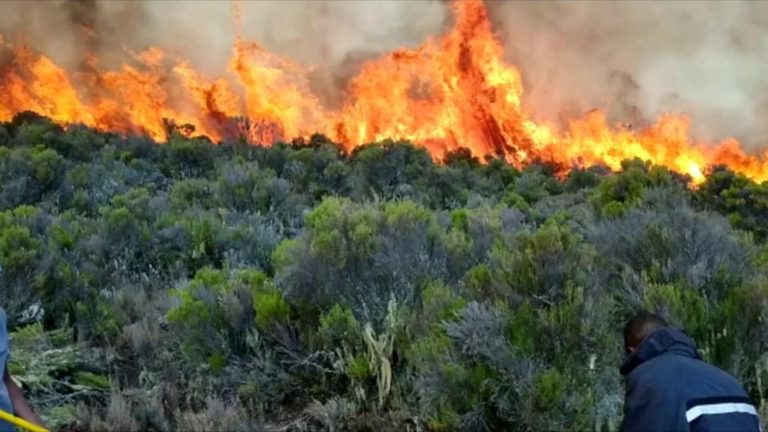Kilimanjaro, Tanzania — As firefighters were battling raging inferno on Mt. Kilimanjaro, plumes of smoke belching into the sky captured the destruction on Africa’s highest mountain and its surrounding ecosystems.
The fast-spreading bushfire erupted at an overnight resting camp for hikers—provoked roaring flames that have destroyed one of the world’s richest and most diverse ecosystems.
World’s Tallest Mountain
Kilimanjaro, the world’s tallest free-standing mountain at 5,895 meters (19,341 feet) above sea level, is highly vulnerable to environmental degradation partly caused by worsening impacts of climate change and increasing human activities.
Rampant illegal logging, poaching wildfires, pollution, and beekeeping have encroached on the ecosystem around the mountain, thus disturbing a forest belt surrounding it, officials said.
The snow-capped mountain, which attracts thousands of tourists every year, is a UNESCO Heritage Site with rare plants and animal species.
Tourism is a cornerstone of Tanzania’s economy, contributing about 17.2% to the country’s GDP and 25% of all foreign exchange revenues. The sector, which employs more than 600,000 people, generated approximately $2.4 billion in 2018, government statistics show.
Favorite Tourist Destination
As one of Africa’s favorite tourist destinations, Kilimanjaro is known for its breath-taking attractions, including stunning landscapes dotted with wildlife, waterfalls, and rich cultural heritage.
However, activists are increasingly worried about the rapid shrinking of the natural forests cover.
“We must do something to prevent frequent fire outbreaks,” said Eliakim Meena, an environmental activist from Nkweshoo cultural tourism program in Kilimanjaro.
Illegal Logging
As the country’s best tourist attraction Mount Kilimanjaro generates an estimated US$ 50 million in revenue annually but is vulnerable to environmental risks, local experts said. Padili Mikomangwa, a Dar es Salaam based environmentalist said native forest and shrubs are being destroyed by illegal loggers and beekeepers, consequently disturbing rainfall patterns.
“The forest itself is the key element in this. It completely affects the amount of rain running off the mountain,” he said.
With less rainfall on the lower slopes, the snow on the summit is also shrinking.
Mikomangwa said forests that vanished in the past four decades on Kilimanjaro’s lower slopes — felled by villagers for charcoal and open farmland — were just as much to blame as rising heat.
Extreme Weather
The extreme weather currently experienced in Kilimanjaro is a surprise to many local residents, who are used to a cold misty climate.
Jacob Chuwa, 72, a resident of Moshi, told Ubuntu Times that the annual rainfall has been declining from year to year, affecting the livelihoods of farmers.
“We have never experienced such erratic weather before, it is quite surprising,” he said.
While trees play an important role in maintaining natural water cycles around Mt. Kilimanjaro, Meena said its forest cover is rapidly waning.
Fandey Mashimba acting Manager, (Seed Biology) at Tanzania Forest Services Agency said deforestation is driven by increasing energy needs as people are engaging in charcoal making.
“It is a huge problem and most of it is happening because people don’t have energy supplies so they are cutting down the trees to make charcoal,” Mashimba said
Government Intervention
According to the United Nations Environment Programme (UNEP), reduced rainfall and increasing temperatures around Kilimanjaro have triggered the mountain’s vulnerability to fire and deforestation.
However, the government is taking measures to fight illegal logging and to educate local people on the importance of conserving their environment.
“We have several tree-planting initiatives and local residents are actively participating in the schemes,” said Anna Mngwira Kilimanjaro Regional Commissioner.
Jane Masawe, who lives on the western slopes of Mount Kilimanjaro, uses a traditional inter-cropping method in her farm to grow a mix of coffee, bananas, and vegetables.
The 47-year-old farmer is profoundly attached to the environment, for she knows her family directly depend on the natural ecosystems of the mountain.
Masawe, who displays a vast indigenous knowledge of her environment, has respect for natural resources.
“Most of the perennial streams flowing down had dried up due to deforestation in the catchment area,” she said.
Changing Weather Patterns
Rapid population growth, changing weather patterns, increasing deforestation have resulted in worsening soil erosion, soil infertility, and an increase in damaging surface runoff, which resulted in decreased land productivity and food insecurity.
To address those issues Masawe has adopted sustainable farming practices and land management technologies to restore productivity.
“I was trained to use bench terraces, to conserve soil and water. They help to reduce the slope steepness and prevent loss of soil downhill,” she said.
















